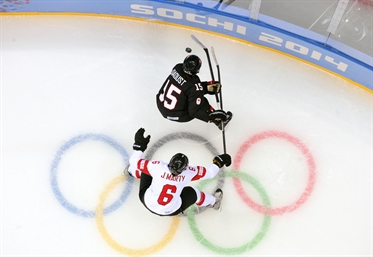Best women’s tournament ever
Best women’s tournament ever
Sochi brought out the best from eight nations

 Medal winners among each other. The gap between Canada (gold) and Switzerland (bronze) has become smaller, games more exciting in Sochi 2014. Photo: Andre Ringuette / HHOF-IIHF Images
Medal winners among each other. The gap between Canada (gold) and Switzerland (bronze) has become smaller, games more exciting in Sochi 2014. Photo: Andre Ringuette / HHOF-IIHF Images
Indeed, teams around the world can start their planning for the next four-year cycle which will culminate in PyeongChang in February 2018.
The women’s ice hockey tournament in Sochi was, quite simply, the best in the 24-year history of the event in IIHF competition. Of course, the Olympics ended with a bang, the most dramatic women’s hockey game ever played. For the Americans, it was a kind of heartbreak they simply didn’t deserve. In control for 56 minutes, they conceded a 2-0 lead and then lost in overtime. Devastating.
For the Canadians, it was an exceptional comeback even for a nation that seems to come up with these late-game dramas whenever it is needed. Either way, the North American rivalry, fierce since 1990, is as strong as ever.
But the highlights from Sochi hardly end there. Just about every team had something to come away with that was encouraging and positive.
Consider Switzerland. Goalie Florence Schelling was named tournament MVP thanks to incredible play and, more important, incredible results. Against Canada, the Swiss played six periods of hockey. They won one, 1-0, for the first time ever, tied two others 0-0 for the first time, and lost by a cumulative score of just 8-1, including their best result ever, a 3-1 loss in the semi-finals. Schelling also shut out the Russians 2-0 in the quarter-finals and was great in the bronze medal game, the first Olympic medal for the women on the heels of a Women’s World bronze in 2012.
The Swedes suffered their own heartbreak of sorts in that bronze medal game. Up 2-0 after two periods, they seemed destined to win their first medal at either Olympics or Worlds since 2007 only to watch the Swiss storm back and win, 4-3. But 4th place was still better than what might have expected before the Olympics began, and it included a shocking 4-2 win over the favourites Finland in the quarter-finals.
Continue readingThe Finns have to be disappointed, but they have two of the best players in the world who were at their best. Goalie Noora Raty, who is retiring, was sensational, particularly in a 3-1 loss to Canada, and defenceman Jenni Hiirikoski is the best skater in the women’s game. The pint-size sprite is a joy to watch. Hopefully the 26-year-old will remain with the team for many years to come.
Russia was in a no-win situation. Playing at home and coming off an historic bronze at the 2013 Women’s Worlds under general manager Alexei Yashin, the pressure and expectations were huge. And after winning their first three games, those expectations only increased. They lost their final two games and finished sixth, but there is a core of players that could keep the team among the elite for the foreseeable future.
Germany beat Japan twice and lost a thrilling 1-0 game to Finland. The team showed potential, and its core of young players who have risen from U18 to the senior team is impressive. Incredibly, good news in terms of the improving strength of the women’s game in general is that the Germans are in heated competition to keep their elite status.
The Japanese had to qualify for the Olympics and had had only one previous appearance, in 1998 as host nation. True, the team went without a win in Sochi and will have to play a qualifying series to see if they can stay in WW for 2015, but even this nation made gains.
In 1998, for instance, the team played five games and was badly outscored, 2-45. This year, they scored six times and allowed only 16 goals. In 1998, they allowed double digit goals three times. This year, the most they allowed in a game was six goals. Modest gains, to be sure, but gains all the same.
Women’s hockey still has a long way to go, but it has also come a long way. In Vancouver, one might have said the glass was half empty. But the IOC and IIHF can acknowledge and agree that after the gains made in Sochi, the glass is now half full and then some.
Back to Overview







































